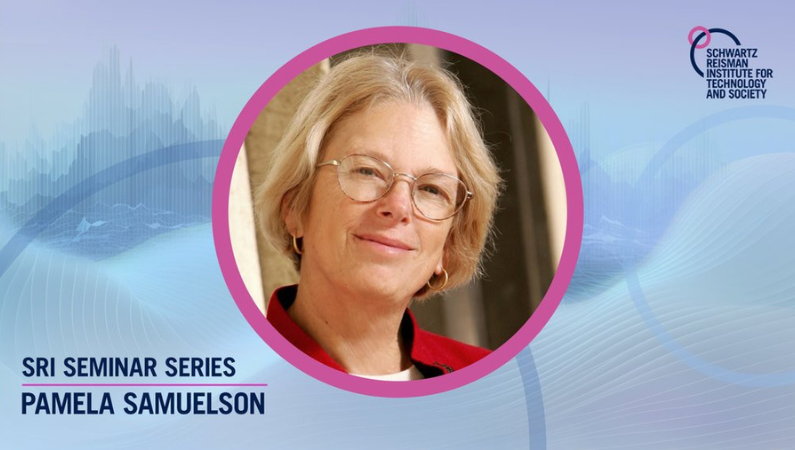
- This event has passed.
SRI Seminar Series: Pamela Samuelson, “Will copyright derail generative AI technologies?”

Our weekly SRI Seminar Series welcomes Pamela Samuelson, Richard M. Sherman Distinguished Professor of Law and Information at the University of California, Berkeley. Samuelson is co-director of the Berkeley Center for Law & Technology, co-founder and chair of the board of Authors Alliance, and a board member of the Electronic Frontier Foundation. She is a recognized pioneer in digital copyright law, intellectual property, cyberlaw, and information policy.
Samuelson’s research focuses on the legal and policy challenges posed by emerging technologies, particularly in the areas of copyright, software protection, and cyberlaw. Samuelson has been honored with the Anita Borg Institute’s Women of Vision Award for Social Impact and Public Knowledge’s IP3 Award for her contributions to Internet law and policy.
Moderator: Lisa Austin
Talk title
Will copyright derail generative AI technologies?
Abstract
At last count, thirty-five lawsuits in the U.S. and two in Canada are challenging the legality of using in-copyright works to train generative AI models. While the lawsuits are still in early stages, fair use/fair dealing defenses are likely to be the main focus of judicial analyses of their merits. This talk will explain the issues that judges have decided so far and what issues have yet to be addressed. Although generative AI developers point to some precedents that support their fair use defenses, this talk will explain why judges may find them not as helpful as the developers hope. At this point, some cases seem stronger than others. Not only are the plaintiffs seeking very large damage awards, but also some want courts to order models trained on the plaintiffs’ data to be destroyed, and courts have power to issue such orders. The broader impacts of these lawsuits for academic research and development are at present invisible to the courts.
About Pamela Samuelson
Pamela Samuelson is the Richard M. Sherman Distinguished Professor of Law and Information at the University of California, Berkeley. She is recognized as a pioneer in digital copyright law, intellectual property, cyberlaw and information policy. Since 1996, she has held a joint appointment at Berkeley Law School and UC Berkeley’s School of Information. Samuelson is a director of the internationally-renowned Berkeley Center for Law & Technology. She is co-founder and chair of the board of Authors Alliance, a nonprofit organization that promotes the public interest in access to knowledge. She also serves on the board of directors of the Electronic Frontier Foundation, as well as on the advisory boards for the Electronic Privacy Information Center, the Center for Democracy & Technology, and Public Knowledge.
Samuelson began her legal career as an associate with Willkie Farr & Gallagher in New York. She began her career as a legal academic at the University of Pittsburgh School of Law, from which she visited at Columbia, Cornell, and Emory Law Schools. While on the Berkeley faculty, she has been a distinguished visiting professor at the University of Toronto’s Faculty of Law, as well as a visiting professor at the University of Melbourne and Harvard Law School. She was named an honorary professor at the University of Amsterdam in 2002.
Samuelson has written and published extensively in the areas of copyright, software protection, and cyberlaw. Since 1990, Samuelson has been a contributing editor of Communications of the ACM, a computing professionals journal respected for its coverage of existing and emerging technologies, for which she has written more than seventy “Legally Speaking” columns. From 1997 through 2002, Samuelson was a fellow of the John D. & Catherine T. MacArthur Foundation. She is also a Fellow of the Association of Computing Machinery. The Anita Borg Institute honored Samuelson with its Women of Vision Award for Social Impact in 2005, and the public interest organization Public Knowledge awarded her its IP3 Award for her contributions to Internet law and policy in October 2010.
Registration
To register for the event, visit the official event page.
About the SRI Seminar Series
The SRI Seminar Series brings together the Schwartz Reisman community and beyond for a robust exchange of ideas that advance scholarship at the intersection of technology and society. Seminars are led by a leading or emerging scholar and feature extensive discussion.
Each week, a featured speaker will present for 45 minutes, followed by an open discussion. Registered attendees will be emailed a Zoom link before the event begins. The event will be recorded and posted online.

